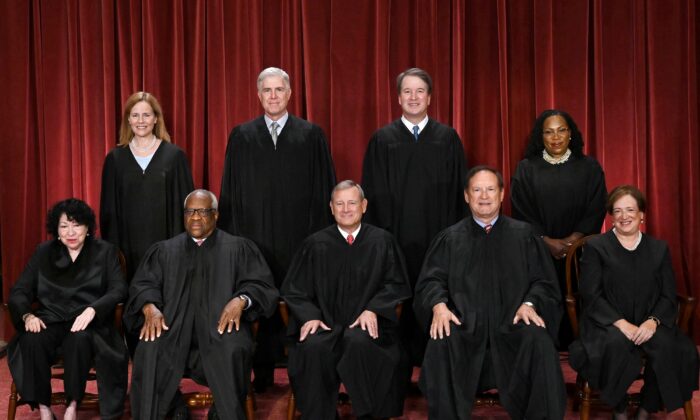Don’t fall for former Supreme Court Justice Stephen Breyer’s newly published call for “pragmatism” rather than “originalism” or “textualism” as the best interpretive method. What Breyer’s suggestion amounts to is the anti-democratic idea that judges should be free to twist what the law says to suit their own prejudices — that is, they should be above the law rather than servants of it.

Breyer has been on a spirited publicity tour for his new book Reading the Constitution: Why I Chose Pragmatism, Not Textualism. Alas, his arguments amount to the same old mush.
The learned justice says his method of judging is needed as a model for successors because “the world does change,” so if the court doesn’t interpret the Constitution as evolvable, too, “we will have a Constitution that no one wants.” Therefore, he says repeatedly, his method “involves purposes, consequences, values, and sometimes much more.”
This sounds high-minded and reasonable, but it is bunk. Even worse, it is a power grab subject to no limiting principle, especially when he goes into an open-ended “much more” phase. Breyer treats as paramount the jurist’s subjective assessment of “values and sometimes much more,” as if he possesses Olympian wisdom about such matter above that of mere mortals. This would turn representative democracy into an elitist oligarchy, a rule by nine supposedly wise men and women, against America’s constitutional design that deliberately separates, disperses, and blends power in multitudinous ways intended to safeguard liberty.
In a republic, applying “values” and trying to create the right “consequences” is the job not of judges but of the people’s elected representatives, or of the people themselves. The Constitution, as fundamental law enacted by the people, is supreme. Statutes written via representative procedures are next. The reason judges, ultimately Supreme Court justices, are final arbiters of what the law means is not because they possess superior moral or value-based perspicacity, but because they are supposed to be the most learned in parsing the words of laws to ensure they are applied faithfully. Jurists are supposed to be guided and humbly governed by the words of the law, not by willful masters over them.
Breyer’s arguments against originalism and textualism are unavailing. Originalism means interpreting the words of the Constitution or statutes by trying to ascertain the original public meaning of the provision at issue, in its original context. Textualism means looking at the text itself, not using a judge’s own values. Despite the facile and ignorant contentions of many media figures, these interpretive approaches do not always require adherence to the Constitution as originally written, but instead to the Constitution as formally amended. The “text” that applies is that of the amendment, not of the passages the amendment replaced.
Judges applying the original public meaning of a constitutional or statutory text are engaged in a narrow academic exercise, not an expression of personal philosophy. To understand a text’s original public meaning, jurists have consistent and reliable tools. They look to dictionaries extant at the time of passage. They look at how a text was consistently applied in the contemporaneous aftermath of passage. They look to the legal history extant at the time. Even though not always simple, this process is admirably straightforward. Moreover, it respects the elective, representative processes — the people’s will — rather than substituting a jurist’s private predilections.
To say this doesn’t allow laws to “change with the times” is nonsense. The Constitution sets up a comprehensive system whereby law can change with the times. Fundamental law, meaning the Constitution itself, can be changed through amendments by supermajorities. Apart from that fundamental superstructure, the Constitution allows huge leeway for legislatures repeatedly to update statutes (or to provide reasonable room for administrative, regulatory updates) to change with the times.
Read More From PatriotAmerican
Originalist-textualist jurisprudence is thus orderly, humble, reasonably objective, and democratic. Breyer’s “pragmatism,” by contrast, invites the mischief of judicial willfulness, unmoored from objective restraints, applied by nine people acting as philosopher kings.
Breyer’s approach is deservedly out of fashion. Even liberal Justice Elena Kagan famously said in 2010 that “we are all originalists” now, and leftist Justice Ketanji Brown Jackson agreed in 2022. In fighting a discredited methodological battle that has already been lost, Breyer is being anything but pragmatic.


This is what progressives want. They want the judicial system to make rules by fiat and usurp the Constitution. As the article states, the Constitution has ways to change. It’s just that the progressives know the American people won’t change it the way the progressives want.